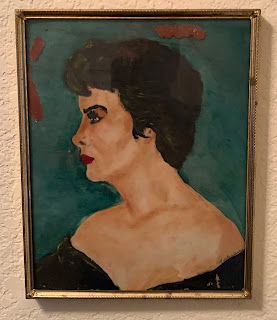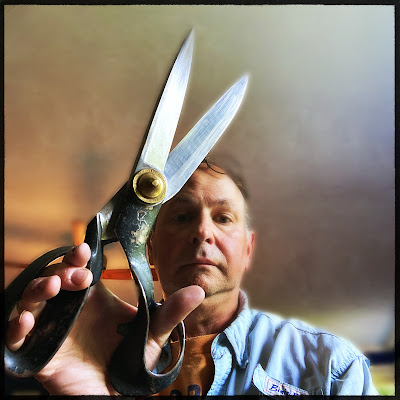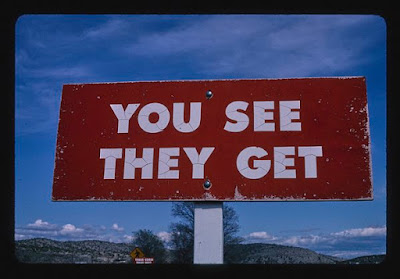I live in Mississippi--the land of magnolia blossoms, blues music, and gator-related accidents (just kiddin'), and where spring thankfully sprang early this year. That was fine with me--I'm one of those folks who absolutely hates cold weather, and when temperatures start to rise it helps not only the greenery but my mood in general.
I've also been fortunate in the story department, this spring. For my SS column today I thought I'd take a look at the different kinds of stories of mine that were published in the past two months, and where they appeared. (This is also the kind of post that requires no work or research, so there's that, too.)
Here goes.

April 1 -- "A Bad Hare Day," Mystery Magazine, April 2023 issue. Most of my stories at MM and its predecessor, Mystery Weekly, have been regular, traditional crime stories between 2000 and 5000 or so words, but this is one of what Mystery Magazine calls You-Solve-It mysteries, flash-length puzzle stories written with an "interactive" format that lets readers try to figure the solution out for themselves. This story involves an attempted robbery by a guy in a bunny costume who performs for a birthday party at the mansion of a Southern big-shot, and is an installment of a series that I long ago labeled my "Law and Daughter" stories, featuring Sheriff Lucy Valentine and her amateur-sleuth mother Fran. "A Bad Hare Day" is about 1000 words and was submitted and accepted back in February 2022. I understand there's a fairly long queue for the You-Solve-Its, so--as in this case--it can sometimes be a while before accepted stories show up. FYI for those writers who don't already know this: Mystery Magazine is one of those publications that pay on acceptance, and they do it promptly--so, many thanks, Kerry!
April 3 -- "Theft at the Rest Stop," Woman's World, April 3, 2023, issue. Editor: Alexandra Pollock. Woman's World's guidelines say their mini-mysteries--which they call Solve-It-Yourself mysteries--should be 700 words max, though mine are always much shorter, between 500 and 600 (once those started working, I've stayed at that length ever since). This particular story is a whodunit involving a crowd of people at a rest stop on an interstate highway, one of whom has stolen a fellow traveler's wallet. On hand to do the police work are Sheriff Charles "Chunky" Jones and his former fifth-grade teacher Angela Potts, a duo who have served me well at WW (thank you sincerely, Alex Pollock!). A reader once told me Chunky and Angela remind her of Sheriff Taylor and Aunt Bee, which I took as high praise--but in truth, my sheriff is far lazier and larger than Andy, his "assistant" is smarter and nosier and bossier than the TV sheriff's mild-mannered aunt, and both of my crimefighters live in a town that so far has never been given a name. For those who're interested, "Rest Stop" (my original title) is 529 words and is my 127th story at WW. It was submitted in February 2023 and accepted later that month.
April 10 -- "Summer in the City," More Groovy Gumshoes: Private Eyes in the Psychedelic Sixties, Down & Out Books. Editor: my psychedelic fellow SleuthSayer Michael Bracken. As I told Michael while I was writing this story, I probably had more fun plotting it than I've had with any in a long time. Required content for this anthology was (1) a private-investigator protagonist and (2) a plot involving a notable event from the 1960s. I think the moon landing and Woodstock were taken, so I chose the Detroit riots, a crime-spree of looting and arson and violence that took place there in July 1967. One of my story's unlikely heroes is a college student from the South who's taken a summer job selling Webster's Dictionaries door-to-door in Flint, Michigan, one of the places that saw spinoff riots that same month. The crime in this story, though, isn't looting and shooting--it's diamond smuggling, which was big business in certain areas back then, and the plot involves a missing delivery of South African jewels, the bad guys' efforts to find them, and a private eye hired to locate and rescue the dictionary-salesman kid who's gotten himself caught in the middle of it. I gave the story the title of a song: "Summer in the City," by The Lovin' Spoonful, which was recorded the year before but was still popular during what would come to be known as The Summer of Love. The story is about 5800 words, was submitted in January 2022, and was accepted that same month. (Michael, it's always a pleasure and honor to be in one of your anthologies.)
April 25 -- "The Florida Keys," Crumeucopia: Strictly Off the Record, Murderous Ink Press. Editor: John Connor. Florida stories are always fun to write because it's such a crazy place (just ask another fellow SleuthSayer, Leigh Lundin), and most of this one takes place at the Fontainebleau Hotel in Miami Beach, a setting I loved and knew well from my IBM days. The story features a vacationing exotic dancer named Roxanne Key, her husband Dennis, their daughter Jacqueline, and a world-weary detective team named Mason and Biggs. This is more of a whydunit than a whodunit, and includes plenty of clues that were great fun to plant and hide, and also the kind of goofy humor that wouldn't fit into a lot of the mystery/crime stories I've written lately. "The Florida Keys" runs about 2500 words, was submitted in October 2022, and was accepted in January 2023. Big thanks to John Connor (!), who also edited my five previous Crimeucopia stories.
May 1 -- "Shadygrove," Get Up Offa That Thing: Crime Fiction Inspired by the Songs of James Brown, Down & Out Books. Editor: Gary Phillips. This was the first of two of my stories published this May that were written for music-themed anthologies. This one was based on Brown's song "Try Me," but I gave the story a different title--in fact the title is the name that one of my characters gave to the setting of the story: a small stand of cottonwoods on the edge of a stream in Central Texas. It features a bounty hunter, the woman he loves (or thinks he loves), and several deadly members of an outlaw gang. The thing that made this story fun to write, for me, was its plot twists: there are at least four surprise reversals in the course of the story, which I hope are as entertaining for folks to read as they were for me to create. All of us know you have to be careful with this kind of thing--it's easy to put too many twists in a story--but I hope it worked, here. "Shadygrove" is around 3200 words, was submitted in October 2021, and was accepted a month later. Though it took awhile to get into print, it was worth the wait--Gary's a great editor.
May 23 -- "The Devil's Right Hand," Weren't Another Way to Be: Outlaw Fiction Inspired by the Songs of Waylon Jennings, Gutter Books Rock Anthology Series. Editor: Alec Cizak. Outlaw fiction?--How could I not want to write a story for a book of outlaw fiction? And who doesn't like the music of Waylon Jennings? For this antho, Alec wanted us to use the song titles as the titles of our stories, and that seemed to work well here. Mine's about a regular guy who gets mistaken on the trail for a famous outlaw in the 1880s, and an ill-advised plan to have him use that uncanny resemblance to rob a bank in the prairie town of Longbow. Like "Shadygrove," this one has twists and reversals galore. There are some bad folks who start out good and good folks who start out bad--I always like that--and a setting that I found myself sad to leave when the writing was finished. Characters include an aimless drifter, a snake-oil salesman (saleslady, actually), a tired sheriff, a smart deputy, and a legendary but reluctant gunfighter. It wound up around 5500 words, was submitted in August 2022, and was accepted the following month. I've had the good fortune to work with Alec on three stories before this one, and he came through as usual. Matter of fact, just about all the anthologies I've been in for the past several years have been blessed with fine editors.
May 26 -- "Last Day at the Jackrabbit," Strand Magazine, Issue #69. Editor: Andrew Gulli. A reader/friend told me this past week that this story reminded him a bit of Hemingway's "The Killers" (I was flattered but I suspect the similarity came from its being set in a diner). In my case it was the Jackrabbit Diner, named for its owner, Jack (you guessed it) Hopper. Jack doesn't show up in the story, though--he's at home drunk as a skunk, as usual--and his head waitress, Elsie Williams, is this story's protagonist. Her less-than-brilliant boyfriend, Mike McCann, has just robbed the players of a high-stakes poker game in a nearby city, never realizing that they're also members of a much more dangerous group--and now they're after him. The lovebirds try to fly the coop, but complications ensue. Another FYI: This story idea began with its ending, and I worked backward from there. It was an ending inspired by the final scene of the 1974 movie adaptation of John Godey's The Taking of Pelham One Two Three--and it's stayed on my mind for more than forty years. I also divided the story up into five parts, which I don't usually do. The sections were: 1. Extermination, 2. Redirection, 3. Coverup, 4. Killing Time, and 5. Termination. More than you wanted to know, right? Anyhow, "Last Day at the Jackrabbit" was my 25th story at the Strand--it's 4000 words, it was submitted in October 2022, and it was accepted in January 2023. Andrew Gulli, by the way, is wonderful. (Hope he reads this . . .)

I have several more stories coming up this month, and I 'm sure my feelings about those will be as fond as my memories of the ones above. I've said this many times, and I truly mean it: One of the reasons I love writing short stories is that every one of them is so different. I get to try lots of varied plots, places, characters, etc., and do it over and over and over again, without having to wait months or years between projects. No offense, novel writers--you're still my heroes--but I dearly love writing these shorts.
If you're a writer, what are some of your recent published stories? Any we might not have heard about? Which are your favorites? Which markets are you most attracted to lately, with your submissions? What kinds of stories are you working on now--or waiting to have published?
I hope you're having as much fun with this stuff as I am.



.jpg)

.jpg)

.JPG)
.jpg)







.jpg)













